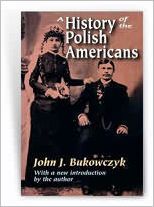|
||
• wydawnictwa polskie
• Zamów informacje o nowościach z wybranego tematu • kontakt
• Cookies na stronie |
HISTORY OF POLISH AMERICANSBUKOWCZYK J.wydawnictwo: TRANSACTION P. , rok wydania 2007, wydanie Icena netto: In the last, rootless decade families, neighborhoods, and communities have disintegrated in the face of gripping social, economic, and technological changes. This process has had mixed results. On the positive side, it has produced a mobile, volatile, and dynamic society in the United States that is perhaps more open, just, and creative than ever before. On the negative side, it has dissolved the glue that bound our society together and has destroyed many of the myths, symbols, values, and beliefs that provided social direction and purpose. In A History of the Polish Americans, John J. Bukowczyk provides a thorough account of the Polish experience in America and how some cultural bonds loosened, as well as the ways in which others persisted. Following a chronological format, Bukowczyk explains the historical reasons that led Polish people to come to America, the experience of the first wave of immigrants, the identity problem of second-generation Poles, and the kind of organizations and institutions that Polonia established in America. Throughout the author wrestles with the question faced by all immigrant groups: What does it mean to be a hyphenated American? And more specifically: What does it mean to be a Polish-American? Table of Contents Introduction to the Transaction Edition xi 236 pages, Paperback Księgarnia nie działa. Nie odpowiadamy na pytania i nie realizujemy zamówien. Do odwolania !. |


